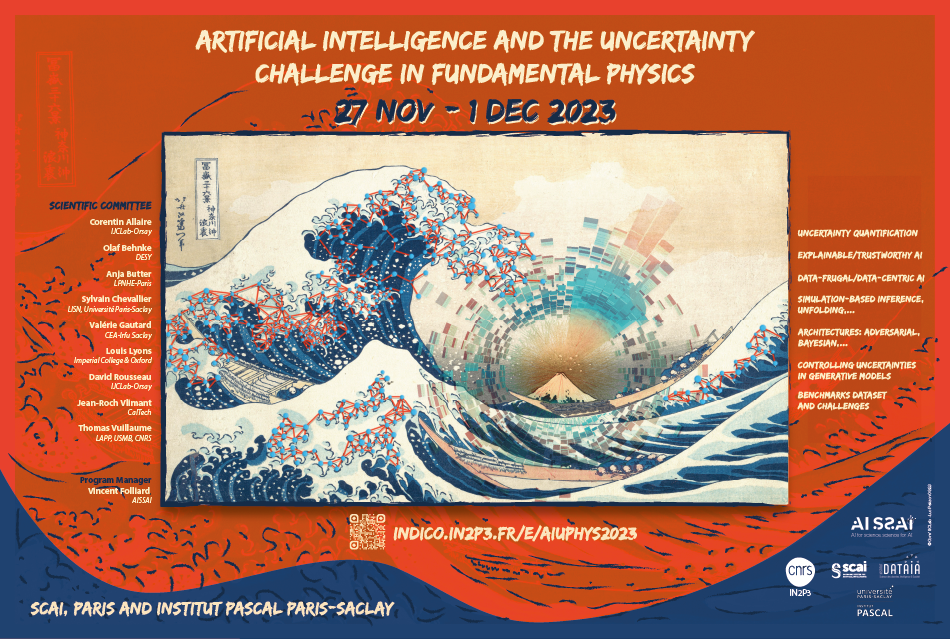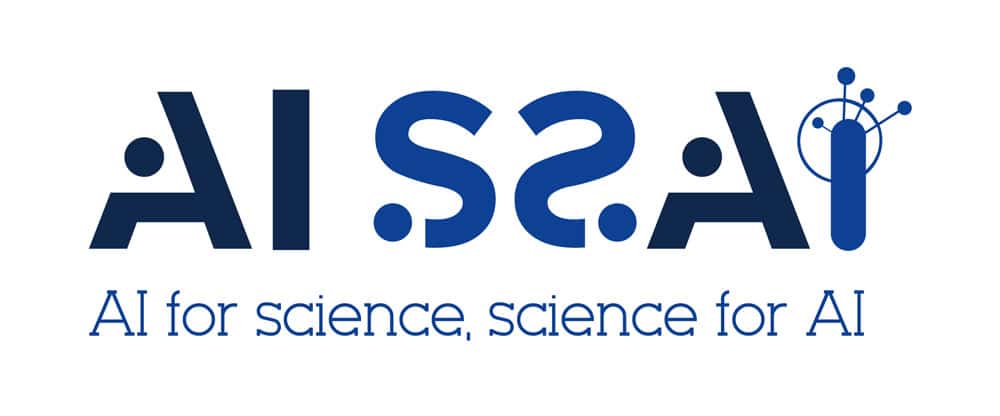- Indico style
- Indico style - inline minutes
- Indico style - numbered
- Indico style - numbered + minutes
- Indico Weeks View
Artificial Intelligence and the Uncertainty challenge in Fundamental Physics
→
Europe/Paris
Description
The workshop is organised by CNRS AISSAI and CNRS IN2P3.


The integration of Artificial Intelligence (AI) into the realm of fundamental science is witnessing an unprecedented surge. However, there are specific challenges to be overcome:
- any measurement or prediction has to be provided with a precise confidence interval
- measurements rely on numerous inputs, each with inherent uncertainties and potential inter-correlations
- the trust in the measurement has to be communicated to peers
- an experiment complexity is between the breakout game and autonomous car: detailed, expensive, imperfect simulators exist
- each experimental device is a complex unique device, producing semi-structured data
- expensive data in the petabytes range
These challenges have been overcome in the past for extraordinarily complex measurements where the role of AI was not major (e.g. Higgs boson or gravitational wave discoveries). Also, Fundamental Science has decades-old big data culture.
This workshop aims to bring together experts from Fundamental Science, Computer Science and Statistics to exchange around the theme of Uncertainties, which has been broken down into the following themes:
- Monday PM : Opening session, Uncertainty Quantification, uncertainty prediction
- Tuesday AM : Explainable AI, trustworthy AI
- end of Tues AM, Tuesday PM : Simulation-Based Inference
- Wednesday AM : Data frugal approaches, Data-centric AI ; Benchmarks dataset and challenges
- Wednesday PM : Fair Universe hackathon
- Thu AM Unfolding (or de-biasing, de-blurring)
- End of Thu AM, Thu PM Controlling uncertainties in generative models
- Fri AM Architectures (Adversarial, Bayesian, ... )
- Fri PM Closing session
Each theme will see introductory talks by leading experts, followed by contributed talks.
Confirmed speakers list includes : Luca Biferale (U Roma 2), Mathias Backes (Kirchhof Institute), Sebastian Bieringer (U Hambourg), Jérôme Bobin (CEA-Saclay), Vincent Chabridon (EDF), Yuan Tuan Chou (U Washington), Vince Croft (NIKHEF-Amsterdam), Tommaso Dorigo (U Padova), Eva Govorkova (MIT), Marylou Gabrié (Ecole Polytechnique), Julien Girard-Satabin (CEA), Nathan Huetsch (U Heidelberg), Eiji Kawasaki (CEA), Gregor Kasiezcka (U Hamburg), Sabine Kraml (LPSC-Grenoble), Mikael Kuusela (Carnegie Mellon), Alessandro Leite (LISN), Gilles Louppe (U Liège), Mark Neubauer (U Illinois), Harrison Prosper (Florida State U), Radi Radev (CERN), Pedro Rodrigues (INRIA-Grenoble), Ozgur Sahin (CEA-Saclay), Simone Scardapane (U Roma), Sofia Schweitzer (U Heidelberg), Laurens Sluyterman (U Radboud), Gaël Varoquaux (INRIA-Saclay), Emmanuel Vazquez (L2S-Saclay), Wouter Verkerke (U Amsterdam), Gordon Watts (U Washington), Christoph Weniger (U Amsterdam), Philip Windischhofer (U Chicago), Burak Yelmen (U Tartu)
and most of the Fair Universe team : Yuan-Tang Chou (University of Washington), Wahid Bhimji (NERSC-Berkeley), Ragansu Chakkappai (IJCLab-Orsay), Yuan-Tang Chou (University of Washington), Sascha Diefenbacher (LBNL-Berkeley), Steven Farrell (NERSC-Berkeley), Elham Khoda (U Washington), David Rousseau (IJClab-Orsay), Ihsan Ullah (ChaLearn)
Also a special half-day hackathon on the Fair-Universe prototype challenge on Wednesday afternoon. The goal? Craft ML algorithms that can derive measurements with uncertainties from simulated LHC proton collisions, ensuring robustness against input uncertainties.
Registration and call for contribution
Registration is free (but mandatory). Registration for on-site participation (including monday cocktail and thursday workshop dinner) remains open until the last few available slots are distributed.
Remote full-time or part-time participation will be possible, although the focus will be on-site. The registration form allows to specify on-site participation with some granularity. The zoom link will be distributed to participants only.
The call for contributions is closed. Talks are expected to be given in person, with few exceptions.
Location
The workshop will take place from Monday 2PM till Tuesday evening in Paris at SCAI, Paris (on Jussieu campus) and Wednesday, Thursday, Friday 5PM at Institut Pascal Université Paris-Saclay.
And finally
A companion anomaly detection workshop will take place in Clermont-Ferrand 4-7th March 2024
All slides and recordings are available in the detailed agenda (Timetable). For recordings, we advise to right click and save, rather than play directly.
Participants
Adil Jueid
agrebi said
Alberto Carnelli
Alberto Prades
Alessandro Leite
Alexandre Boucaud
Aman Desai
Anja Butter
ANNA CORSI
Antonio D'Avanzo
Arsene Ferriere
Artemios Geromitsos
Aurelien Benoit-Levy
Aurore Savoy-Navarro
Aveksha Kapoor
Badr ABOU EL MAJD
Baptiste Abeloos
Baptiste Ravina
Binis Batool
Biswajit Biswas
Brigitte PERTILLE RITTER
Burak Yelmen
Cecile Germain
Cedric Auliac
Christoph Weniger
Christophe Kervazo
Christos Vergis
Corentin Santos
Cupic Vesna
Damien THISSE
Daniel Felea
Davide Valsecchi
DIMITRIOS TZIVRAILIS
Eiji Kawasaki
Elham E Khoda
Enzo Canonero
Eric Chassande-Mottin
Erik Bachmann
Esteban Andres Villalobos Gomez
Farida Fassi
Fedor Ratnikov
Gael Varoquaux
Gamze Sokmen
Gilles Grasseau
Gilles Louppe
Graham Clyne
Graziella Russo
Gregor Kasieczka
Harrison Prosper
Hubert Leterme
Ian Pang
Ignacio Segarra
Igor Slazyk
Ihsan Ullah
Isabelle Guyon
Israel Matute
Jack Harrison
Jacob Linacre
Jay Sandesara
Jean-Pierre DIDELEZ
Jerome Bobin
Joseph Carmignani
Juan Sebastian Alvarado
Judita Mamuzic
Judith Katzy
Julia Lascar
Julien Donini
Julien Girard-Satabin
Julien Zoubian
Justine Zeghal
Lee Barnby
Louis Lyons
Maciej Glowacki
Manuel Gonzalez Berges
Marco Letizia
Marion Ullmo
Mark Neubauer
Marta Felcini
Martin de los Rios
Marylou Gabrié
Masahiko Saito
Mathias Josef Backes
Mikael Kuusela
Milind Purohit
Mykyta Shchedrolosiev
nacim belkhir
Nadav Michael Tamir
Natalia Korsakova
Nathan Huetsch
Nicolas BRUNEL
Olaf Behnke
Paolo Calafiura
Patricia Rebello Teles
Philipp Windischhofer
Pranjupriya Goswami
Radi Radev
Rafal Maselek
Redouane Lguensat
Ricardo Barrué
Roberto Ruiz de Austri
Rodrigo Carvajal
Roel Meiburg
Rui Zhang
Rukshak Kapoor
Santiago Peña Martinez
Sascha Diefenbacher
Sebastian Bieringer
Sebastian Schmitt
Simone Scardapane
Stefano Giagu
Steven Calvez
Theodore Avgitas
Thomas Bultingaire
Thomas Vuillaume
Tiago Batalha de Castro
Tommaso Dorigo
Trygve Buanes
Valérie Gautard
Viaud Benoit
Vidya Manian
Vincent Alexander Croft
Vincent CHABRIDON
Vincent Garot
Wahid Bhimji
Wassim KABALAN
Won Sang Cho
Xi Wang
Xuanlong Yu
Yaron Ilan
Yiming Abulaiti
Yong Sheng Koay
Yuan-Tang Chou
zahra mohebtash
Zakia BENJELLOUN-TOUIMI
Zhihua Liang
- +100



